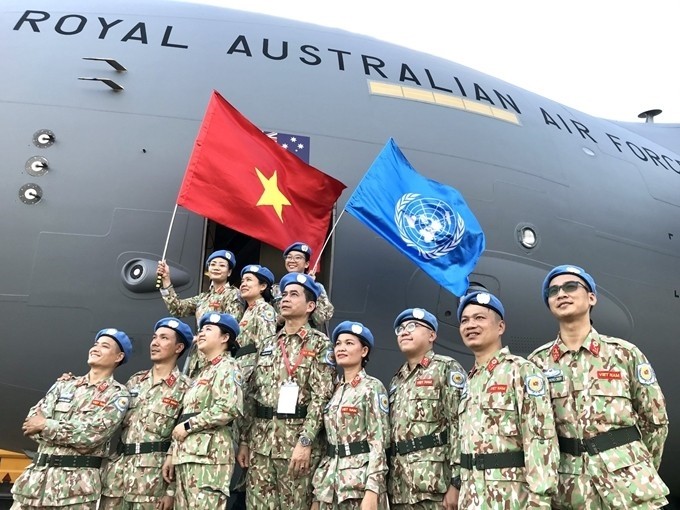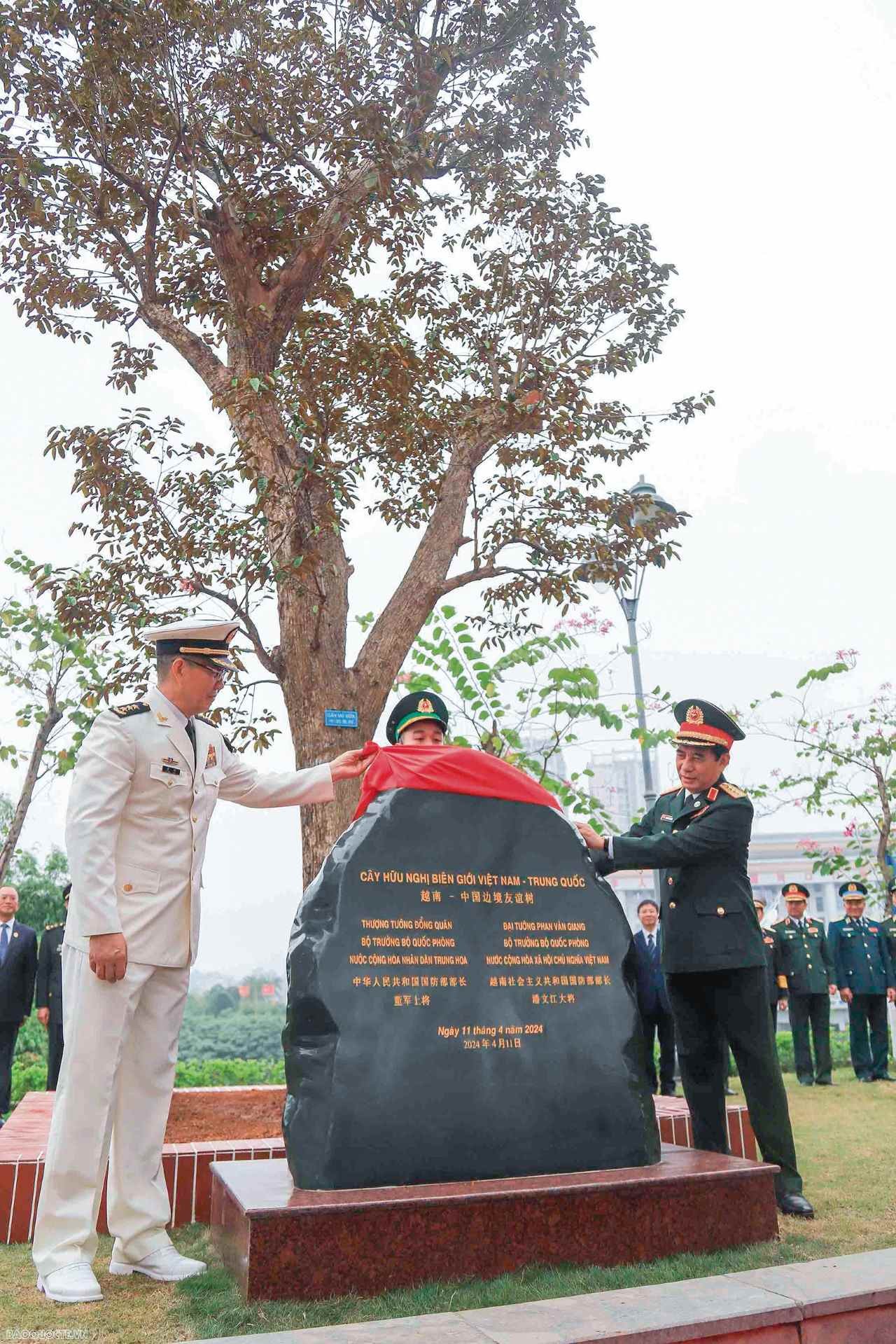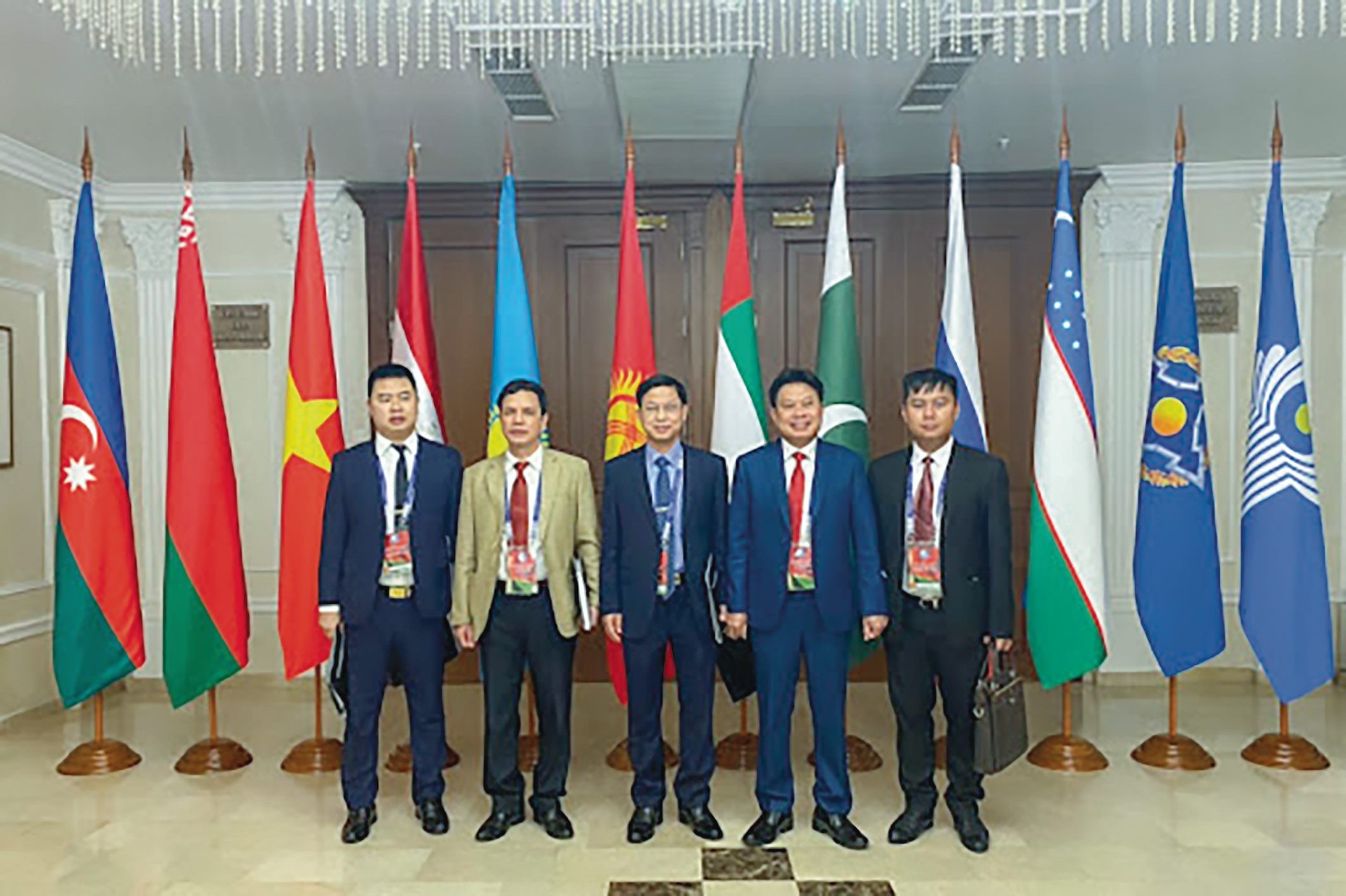
The Geneva Agreements: A valuable lesson on defense and security external affairs in the new context
Latest
 |
| Vietnamese peacekeepers help promote Vietnam’s image in the international arena. |
The significance and value of the Accords
The signing of the Geneva Accords, by all parties involved in the Conference, with the majority of permanent members of the United Nations Security Council, was an international acknowledgment of the complete failure of the French colonial war of aggression and the recognition of Vietnam’s total independence and territorial sovereignty.
For the first time, the French government and each countries involved pledged to respect the sovereignty, independence, and territorial integrity of Vietnam, and to absolutely refrain from interfering in Vietnam’s internal affair. The French military had to withdraw from Vietnam. This was a great victory for the Vietnamese military and people after nine years of fierce resistance with countless sacrifices but tremendous resilience, under the leadership of the Party and President Ho Chi Minh, against the French colonial war of aggression and U.S. intervention, aimed at achieving true independence and freedom for the nation.
The signing of the Geneva Accords signified not only the victorious resistance war against French colonialism and U.S. intervention but also the complete end of the colonial invasion of France in Vietnam. It also opened up a new, particularly significant period for the Vietnamese revolution: the country was temporarily divided into two regions with different socio-political regimes. The North was completely liberated and it underwent restoration, economic development and and socialist construction. It was gradually becoming the stronghold for the nationwide revolution and a solid rear base for the people of the South to continue the struggle for national liberation and reunification.
After the signing of the Geneva Accords, it was expected that both the North and South Vietnam would achieve peace and conduct negotiations, general elections to unify the country in July 1956. However, due to the imperialist actions of the United States and its accomplices with the long-term scheme of dividing and ruling our country, the crucial provisions of the Accords could not be implemented. Therefore, the Vietnamese people had to undergo a bitter and arduous resistance war against the United States to save the nation. The struggle went on for 21 years, and in the end, Vietnam finally achieved national reunification in the Spring of 1975.
 |
| Minister of National Defense Phan Van Giang and his Chinese counterpart Dong Jun planted friendship tree on the Vietnam-China border, April 11, 2024. |
The Geneva Accords are manifestations of the success of Vietnam’s policy line of revolutionary and people’s war in a “collective, comprehensive, long-term and self-reliant” manner, which is initiated and led by the Party and President Ho Chi Minh. It creatively implemented the correct foreign policy approach of “making friends, reducing enemies” and “knowing how to win step by step” as advocated by the Party and President Ho Chi Minh. It was the comprehensive strength of the entire people in the resistance war against French colonialism in Vietnam, epitomized by the decisive victory of the Dien Bien Phu Campaign, that led to the signing of the Geneva Accords. General Navarre, the French Commander-in-Chief in Indochina during 1953-1954, acknowledged, “The French expeditionary force not only had to contend with a regular army but also had to confront an entire nation.”
The signing of the Geneva Accords in July 1954 marked a significant milestone in Vietnam’s diplomatic history. This was the first time Vietnam steps onto the multilateral negotiation platform with the participation of major powers to discuss issues related to the fundamental rights of the Vietnamese people amidst complex global developments and international relations. The major countries involved pursued different goals and interests, yet Vietnam achieved victory, bringing significant and just benefits to the nation. As President Ho Chi Minh affirmed, “The Geneva Conference has concluded. Our diplomacy has achieved great victory...” At this moment, these diplomatic achievements have brought new status and strength to our country on the international stage.
The signing of the Geneva Accords, the outcomes of the Geneva Conference brought invaluable historical experiences to the Vietnamese revolution, particularly in the subsequent diplomatic struggle at the Paris Conference (May 13, 1968 - January 27, 1973). We gained more experience, engaging in direct negotiations with the United States without the involvement of any intermediary countries. We implemented a combination of military and political struggle with diplomatic efforts, creating a “fighting while negotiating” strategy.
To inherit and promote
Based on the steadfast foreign policy of the Party, current defense and security foreign affairs must continue to inherit and promote the values of the Geneva Accords and apply the experience from this conference to enhance the effectiveness of defense and security foreign affairs in the new situation.
Accordingly, defense and security foreign affairs must continuously be strengthened towards “making more friends, reducing enemies.” We should expand and deepen cooperation with countries, organizations, and international institutions, gradually integrating Vietnam’s defense and security into the world. It is important to actively innovate the contents and forms of relationships, military and security cooperation should be expanded into multiple areas, with various partners, including breakthrough elements contributing effectively to socio-economic development, maintaining national security, and safeguarding the independence, sovereignty, unity, and territorial integrity of the Fatherland, thus enhancing the reputation and position of the country and its military and police forces in the region and and the world.
In present defense and security foreign affairs, it’s not only about enhancing cooperation but also about putting a focus on struggle, and we should combine both cooperation and confrontation across various aspects and fields. When dealing with disputes and conflicts, it’s essential to skillfully engage in struggles, clearly identifying priorities in relationships with neighboring countries, regions, major powers, traditional friendly countries, and others. Bringing defense and security foreign affairs into depth is crucial for practical effectiveness.
Defense foreign affairs should consistently implement the “4 Nos” defense policy: no partaking in military alliances, no siding with one country to act against another, no foreign military bases in the Vietnamese territory or using Vietnam as leverage to counteract other countries, and no using force or threatening to use force in international relations.
 |
| The Vietnamese Ministry of Public Security’s delegation attended a scientific conference at the Security University of the Belarusian National Security Committee. |
It is crucial to actively and proactively fulfill commitments through regional and global cooperation mechanisms on preventing and combating non-traditional security risks, preserving peace, and enhancing Vietnam’s international stature; participating in UN peacekeeping activities; coordinating search and rescue, patrolling borders on land and at sea with some countries... This process must continue to focus on implementing the Resolution No. 806-NQ/QUTW, dated December 31, 2013 of the Central Military Commission “On international integration and defense foreign affairs until 2020 and the following years.”
Regarding security foreign affairs, we should continue to implement the foreign security strategy and engage with law enforcement agencies of other countries, international organizations, building a peaceful environment for nation-building, protection, and development; proactively participating in international forums on crime prevention and combating; building and effectively implementing security dialogue mechanisms; seizing opportunities, choosing the level and scope of participation, and initiating regional and international linkages appropriate to Vietnam’s interests.
Seven decades have passed, but the historical significance and the lessons learned from the Geneva Accords remain valuable. In the new situation, it is necessary to continue inheriting and promoting the values of the Accords in defense and security foreign affairs activities, contributing to the maintenance of a peace, political stability, national security, in service of socialism development of the country.












